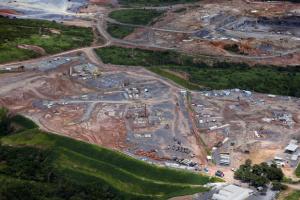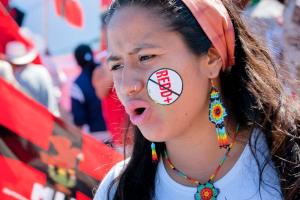Organizations and individuals in the state of Acre and other states in Brazil sent an open letter this month to the governor of California and the California REDD Offset Working Group, challenging the legitimacy of a “consultation” carried out – through three workshops in California and over the internet, in English – regarding the inclusion of REDD offsets, primarily from Acre, in California’s carbon trading scheme.
Brazil
Bulletin articles
30 April 2013
Bulletin articles
30 April 2013
In March 2013, the presidents of the so-called BRICS countries – Brazil, Russia, India, China and South Africa – met in Durban, South Africa. Surrounded by security barriers so that no one who would dare to protest could get near them, the presidents of these nations discussed a number of issues, including cooperation proposals.
One of the proposals most widely highlighted in coverage of the event was the creation of a BRICS development bank, with USD 50 billion in seed capital contributed in five equal parts by the bloc’s member countries.
Other information
30 April 2013
The Eastern Amazon Forum (FAOR) of Brazil issued a public statement in April in support of the Munduruku indigenous people, in response to the recent invasion of their lands in Medio Tapajós, Itaituba.
Other information
30 March 2013
Since last March 18, workers of the pulp mill Veracel, a company equally the Swedish-Finnish Stora Enso and Fibria of Brazil, started an unlimited strike due a deadlock in the salary negotiations for the period 2012-2013.
The strike also unveiled a facet cruel Finnish transnational: the company does not recognize most of the occupational health related diseases, mainly in the field of mechanical harvesting.
Veracel entered, on March 20, a lawsuit against the union, trying to criminalize the strike and that the Justice declare the strike illegal.
Other information
30 March 2013
Gathered at a fourth binational meeting, representatives of the Matsés indigenous peoples' from Brazil and Peru expressed their opposition to all oil industry activity within their territories in both countries. The Matsés have already suffered the social impacts of oil exploration and experienced its drastic consequences for the flora, fauna and water resources. This is why they demand that the authorities respect their stance, particularly with regard to the defence of the Yaquerana River basin, which is home to indigenous groups living in voluntary isolation, they stressed.
Other information
30 March 2013
A movie of An BACCAERT, Nico MUÑOZ and Cristiano NAVARRO (Directors)
Production of Directors - 2011
32 '
In the south region of Mato Grosso do Sul, in the border of Brazil and Paraguay, the most populous indigenous nation of the country silently struggle for its territory, trying to contain the advance of its powerful enemies.
Bulletin articles
27 February 2013
Close to 3,000 members of the Peasant Women’s Movement (MMC), hailing from 23 different states, gathered on February 18-21 for the first national meeting of the organization. The central theme of the gathering was the fight against violence against women. On the morning of the last day, the women filled the plaza in front of the National Congress building in Brasilia with the colour purple and shouted out slogans.
Other information
30 January 2013
Brazil’s Landless Workers Movement (MST) has announced, “We are beginning the year 2013 with several struggles, which represent MST’s response to the irresponsibility of governments. If we do not fight for agrarian reform, which is currently at a standstill, and for the punishment of murderer Adriano Chafik, who killed five landless workers and remains at large eight years later, it would be as if we ourselves were all dead.”
Other information
30 December 2012
In early December of this year, the Brazilian National Development Bank (BNDES) announced that it was granting a new loan of 22.5 billion reais, the largest in its history, to the Belo Monte hydroelectric dam project.
Other information
14 December 2012
The Mundukuru indigenous community in the Brazilian Amazon state of Para decided to cancel a contract that would have allowed the Irish company “Celestial Green Ventures” to sell carbon credits from forests in their territory. The agreement was signed earlier this year giving the Irish company the right over the carbon in forests inside the indigenous territory.
“We are going to cancel the deal. Many in the tribe didn’t want it, so to avoid problems we decided to stop it,” said Candido Waru, leader of a local association of the Munduruku people.
Bulletin articles
14 December 2012
Testimonies of community women impacted by carbon and forest conservation projects that today are included in the so-called Green Economy.
Other information
14 December 2012
The Pindaré Caru indigenous movement, composed of the Guajajara and Awá people, blocked the VALE multinational mining railway this past Oct. 3 in the town of Alto Alegre do Pindaré, State of Maranhão.
The blockade was mounted in protest to the loosening of Brazilian legislation on indigenous rights (measures such as PEC 215 and Resolution 303/2012 by the State Attorney General). The aim of this loosening is to make it easier for multinational companies like VALE to appropriate indigenous territories and thus benefit even further from the exploitation of these riches.






